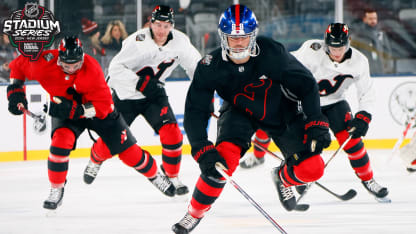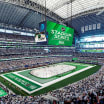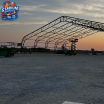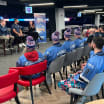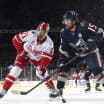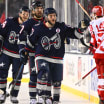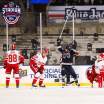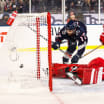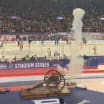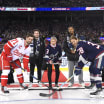EAST RUTHERFORD, N.J. -- The New Jersey Devils are Jersey’s team, and the 2024 Navy Federal Credit Union NHL Stadium Series is Jersey’s event.
Four teams will play at MetLife Stadium. The Devils will host the Philadelphia Flyers on Saturday (8 p.m. ET; ABC, ESPN+, TVAS-D, SN1), and the New York Islanders will host the New York Rangers on Sunday (3 p.m. ET; ABC, ESPN+, SN, TVAS).
But the logo features the name and outline of New Jersey, with the Devils’ original colors of red and green. The field is designed to look like a park in a New Jersey town. The entertainment will have a New Jersey vibe when the Devils play outdoors at home for the first time and draw the largest crowd in their history.
“Sometimes we live in the shadow here, and now we get the big event,” Devils general manager Tom Fitzgerald said. “It’s here at MetLife Stadium. Our whole state can be proud …”
He laughed.
“Even though a lot of these Philly players and coaches live in New Jersey.”
It’s true. They do. A lot of them live in the suburbs across the Delaware River in the southern part of the state. The Flyers practice in Voorhees, New Jersey.
Such is life in a crowded, competitive sports region where loyalty doesn’t always jibe with geography.
The Devils have had to carve out an identity from the beginning. The Kansas City Scouts became the Colorado Rockies in 1976, and the Rockies became the Devils in 1982.
The other three teams were in the NHL already. The Rangers joined in 1926, the Flyers in 1968, the Islanders in 1972.
The Devils have continued to be underdogs around here, especially in comparison to the Rangers, even though they’ve won the Stanley Cup three times (1995, 2000 and 2003) since the Flyers (1975), Islanders (1983) and Rangers (1994) each won their last championship.
“I think everybody’s in a different situation, and I understand the Rangers fans and why they root for the Rangers,” said Martin Brodeur, the Hockey Hall of Fame goalie who is now the Devils executive vice president of hockey operations. “I get it.”
He laughed.
“I’m not saying I like it, but I get it.”
It’s an odd dynamic.
“People envied us, even though we were almost the stepchild there,” Brodeur said. “We built something, and people gave us a lot of respect. They probably didn’t give us the recognition as much as maybe if the Rangers would have done that.”
